
“Stationmaster Mulchester—express running away! Ignoring signals and detonators! She’s bound to crash at your terminus!”
Director: Bernard Vorhaus
Starring: Julien Mitchell, Godfrey Tearle, Hugh Williams, Judy Gunn, Eve Gray, Eliot Makeham, Frank Pettingell, Michael Hogan, Olga Lindo, Mickey Brantford, Sidney Fairbrother, Nelson Keys, Sam Wilkinson, John Lloyd
Screenplay: H. Fowler Mear and John Soutar, based upon a story by J. Jefferson Farjeon
Synopsis: As he returns his train to the yards, it is evident that driver Bob Holt (Julien Mitchell) is in a dark mood. His engineer, Charlie (Michael Hogan), remarks that in Holt’s position, he would be looking forward to retirement. Holt mutters that the railway hasn’t seen the last of him yet… At home, Holt gloomily contemplates the letter informing him that his request to keep working has been denied and that, having reached the official age limit, he can no longer drive trains. His next trip, starting in a mere matter of hours, will therefore by his last. Holt’s wife, Emily (Olga Lindo), tries to console him, telling him that she is looking forward to spending more time with him. Holt admits that he has been out of sorts recently, that his head seems to have been playing tricks on him; however, he brushes aside his wife’s efforts to help, and grows furious when she suggests that he request a relief driver, and not do his last run. As Holt tries to sleep, a worried Emily sends a note to Charlie, asking him to drop by… Meanwhile, eluding the policeman sent to arrest them, Pip (Eliot Makeham) and Daisy (Eve Gray) escape from their house, suitcases in hand, and head for the nearest railway station… Even as Diana Gregory (Judy Gunn) marries Gerald Winter (Hugh Williams) at a London registry office, a second young man is calling at her home to apologise for their quarrel. When he learns, to his horror, where Diana is, and that she and Gerald will be taking the train as part of their journey to the Continent, Tom (Mickey Brantford) sets out in pursuit… After teaching a class in psychology to a class of medical students, Sir Wilfred Rhodes (Godfrey Tearle) is about to take a long-deferred holiday when he is summoned to a hospital at some distance, to perform an emergency operation on a young girl with a fractured skull. Disappointed but resigned, Sir Wilfred heads for the station… Bob Holt jerks out of an uneasy sleep to discover that Emily has not woken him at the agreed time. He rushes from his room—but stops dead at the sight of Emily and Charlie seated together, their heads close together. As he watches, Charlie puts his arm around her. Holt slips back to his room, taking a gun from a drawer; he then calls to Emily, as if he has only just woken up. Emily hustles Charlie out of the house, trying to behave as normal in front of her husband—though this requires denying that anyone called, and hurriedly concocting a story to account for a used tea-cup. Holt lifts his fresh cup and proposes a toast to his last journey… At the station, the stony-broke Pip and Daisy single out a “mark”, Mr Goddard (Frank Pettingell), a good-natured but rather tipsy gentleman whose fat wallet they intend to acquire during their journey. Onboard, Gerald manoeuvres a private compartment for himself and Diana, whose abstracted mood he cannot help noticing: she reacts angrily when he accuses her of thinking of Tom—who is, at that moment, speeding through the streets of London in an effort to see her before the train departs. Sir Wilfred Rhodes, before he boards the train, stops to have a word with the driver about their expected arrival in Mulchester, the last stop, and is promised that they will be there in record time…
Comments: After spending an inordinate amount of time pondering the question, I have come up with the following brilliant solution to the question that has plagued mankind (or at least, me) since the dawn of time (or at least, since 1933): what is the definition of a disaster movie?—to which the answer is:
A disaster movie is a movie about a disaster.

This isn’t the piece of reductive tautology that it seems at first glance (honestly!): it means that a film cannot simply contain a disaster, it must have that disaster as its focus. Whether the disaster actually occurs, or whether it only potentially could, and whether mankind is wiped out or the final body-count is zero, is beside the point. This is why films with spectacular disaster sequences, such as San Francisco and The Hurricane, are nevertheless not disaster movies: these films are about – something else – and then disaster strikes. It is also why a film like, say, The Crowded Sky, where the disaster (such as it is) occupies about thirty seconds out of its 105 minute running-time, is: the rest of the film exists purely to get us to that point.
All of which is a long-winded way of explaining my dawning delight while watching 1936’s The Last Journey, as I realised that I had unexpectedly come across one of the very earliest examples I know of a genuine disaster movie—and the earliest to have that disaster involve passengers trapped on a form of transportation, with things about to go horribly wrong.
The Last Journey was made as a “quota quickie” (the history of which form of film-making we discussed in the context of the 1932 version of The Lodger), and with this in mind I think it’s fair to say that it gives us rather more than we have any good reason to expect; though it is certainly not without serious flaws. Its strength, unquestionably, is that for some inexplicable reason – particularly given the nature of its story! – the Great Western Railway decided to cooperate with its production.
The British passion for train films at this time is well-documented, and encompassed thrillers wholly or mostly set on trains, such as Rome Express and The Lady Vanishes, as well as numerous productions with a train sequence. In many cases, however, the success of these films was undermined by simply awful model work—the use of obvious toy trains on unconvincing scale sets, to a point where it simply wasn’t possible to suspend disbelief.


We get none of this in The Last Journey, which instead includes remarkable footage of real trains on real tracks, travelling through real suburbs and towns and countryside, and arriving – or not arriving – at real stations. (If you’re anything of a train historian, or just have an interest in seeing almost-documentary footage of England in the 1930s, this film is a goldmine.) This is, like all the quota quickies, just a “little” film, low-budget and running only fractionally over an hour. Certainly it could have been made using sets and models, but in the end it is the genuine railway locations and paraphernalia that make The Last Journey so unexpectedly memorable. In this respect I am put in mind of the later productions of Andrew and Virginia Stone (and in particular, of course, of The Last Voyage!), who nearly always shot on location and in real facilities, and whose films are quite distinct in look and tone as a consequence.
Not just the use of this material, but the way in which it is used, should be highlighted, with the location footage well and cleverly integrated into the main story via the editing of Lister Laurence, who also succeeds in building some genuine tension over the final quarter of this film with the increasing tempo of his cutting, and the direction of Bernard Vorhaus. Vorhaus was American, and had established himself as a screenwriter in Hollywood during the 1920s, but he moved to England early in the 1930s due to his impatience to direct; granted, he may have got a little more than he bargained for when he landed at Twickenham Studios. (It should be mentioned that some sources list John Brahm as an uncredited co-director.)
The fact that I’ve started out praising the “externals” of The Last Journey is probably sufficient to clue you in on where this film falls down. The writing is a real mixed bag, wandering strangely from the painful to the good and subtle and then back again; while more than a little of the acting is rather clunky. In particular, Julien Mitchell just isn’t up to the task of conveying Bob Holt’s increasing mental turmoil, too often resorting to a crude “cackling madmen” performance. There is also what I can only call a superabundance of Odious Comic Relief—although at the same time, not nearly as much as I was expecting from the opening credits, which reduce us to skin-crawling dismay with a promise of “The Frenchman” and “The Stutterer”.
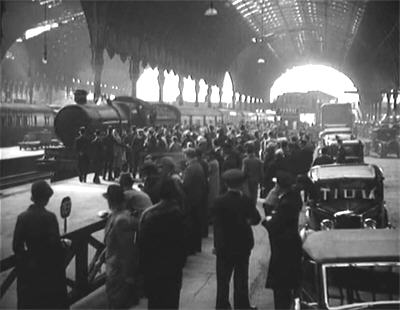

Curiously, however, this is not actually the source of most of our pain. The “joke” regarding The Stutterer is that he never gets any further than an attempt at the first word of his sentence: whoever he is talking to, usually the steward, promptly abandons him for someone else. Tasteless as this is, it’s at least better than the protracted stuttering sequences we usually associate with this sort of “humour”. As for The Frenchman, his nationality is almost irrelevant; his subplot is that he spends the whole film trying to use the men’s room, but is always forestalled; his punchline is that he ends up on a railway platform confronted by public toilets that are out of order. Why is he French? – so that in this context, he can get away with saying, “Oui, oui.”
No, really.
Yet it is the OCR about which the credits do not warn us that really hurts: amongst the passengers is Miss Grebe, a temperance advocate who spends the whole film butting into everyone else’s conversations and forcing her pamphlets on them; naturally she is last seen taking a swig of brandy and finding out she likes it. There’s also Miss Smith, “a bundle of nerves”, who exasperates Sir Wilfred (among other people) with her hypochondriacal fretting. Oh! – and there’s a mother with so many children, the baby has to travel in the luggage rack. I think that’s it. And if it’s all the same to you, we’ll just ignore the lot of them as much as possible, going forward.
It is with respect to Bob Holt’s story that we find the best writing in The Last Journey. There’s no info-dump here, no long speeches: we pick up the back-story in fits and starts, and an alarming one it is. For many years, Holt has been a model employee, never missing a day’s work, never even late. Just recently, however, things have started to go wrong… We infer that there has been trouble on the job, a near miss or two. It also becomes clear that Holt’s friend and workmate, Charlie, has felt obligated to report this, though quietly; while the company, in turn, could have let Holt go on working despite the age rule, but has chosen to enforce it as a way of letting him retire with dignity.
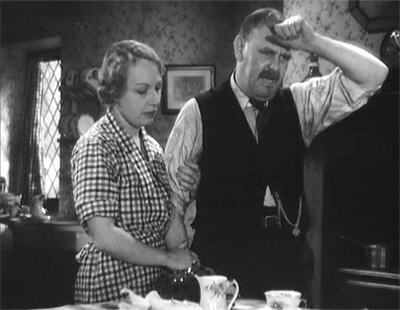

But Bob Holt has no intention of doing anything of the kind. While he knows that, “My head’s been playing tricks on me lately”, it does not occur to him that this is at the root of his belief that Emily and Charlie are having an affair. And they have been meeting secretly—to talk over their mutual concern; Charlie has at some point also warned Emily that something was wrong, although until now she has been reluctant to listen to him. All Holt sees, however, is his wife and his best friend deceiving him and conspiring against him, just at the moment when the railway company he has served so diligently has turned on him…
And of course, it doesn’t help that the Holts occupy a company house that literally backs onto the rail-yards. Bob is in the habit of leaving the windows open; he has always loved the sound of the trains just outside. Now that sound is like a taunt…
The next phase of The Last Journey is, naturally, an introduction to the passengers whose fate will become bound up with the precarious mental condition of Bob Holt. Here again the film does something very clever: it uses a railway map of London to show us the various points from which are characters are emanating, before they converge upon Paddington Station; stopping off in between these interludes to return us to the goods yard of the Great Western Railway, where the train is being prepared and loaded for its journey.
We are first introduced to Pip and Daisy, career criminals on the run from the law, intent upon getting out of London, and possibly England, as quickly as possible, and preferably at someone else’s expense. To this end, Daisy allows herself to be picked up by the gregarious Mr Goddard, who has already had a few too many when they meet, and has put away a few more by the time they board the train together.
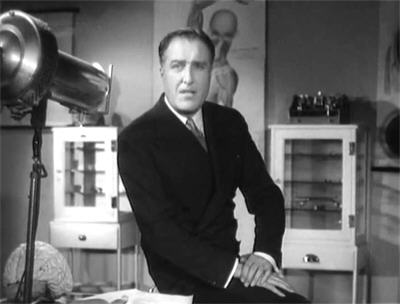
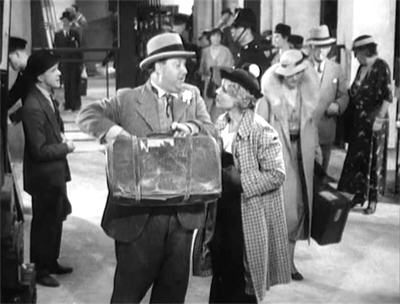
We also meet newlyweds Diana and Gerald Winter—and, after all, this would hardly be a proper disaster movie without newlyweds, now, would it? (On that point, there’s also a cute kid travelling alone, of whom surprisingly little is made.) But from our first glimpse of Diana, we know she’s having second thoughts about this rushed marriage. She and Gerald have only known each other about three weeks, in fact – “Not bad for a month’s work,” he comments complacently. He also seems a little more insistent about his career in “finance”, and his intention of managing Diana’s money, than is entirely reassuring. Conversely, we suspect that Diana’s heart is really with her former boyfriend, Tommy; his is certainly with her, as we see from his desperate effort to, first of all, stop her boarding the train, and then, when he just fails to do so, his even more desperate chase of the train in his car: Diana is not going to “the Continent” with Gerald Winter if he has anything to say about it…
(Were people really still saying “the Continent” in 1936?)
Sir Wilfred Rhodes, meanwhile, had no thought of boarding the train. All he wanted to do was attend the Derby, but as so often before, Fate and his career had other ideas. Sir Wilfred is introduced teaching a class on hypnotism and its uses to group of medical students (who he addresses as “Gentlemen” even though there several women in it, grr!); he also speaks about the power of “mental suggestion” in treating people suffering from delusions and related conditions. In an extraordinary moment for a film of this vintage, Sir Wilfred’s test subject is ordered to, “Follow your suppressed desires”—and promptly makes a pass as Sir Wilfred’s male assistant, while the class roars with laughter. Sir Wilfred almost makes it out the door for his day off, but a telephone-call puts a stop to it: he is instead summoned to perform an urgent operation on a girl with a head injury, which sees him boarding the train from London to Mulchester. With the patient’s condition foremost in his mind, he is pleased to overhear a report to the train driver promising clear conditions. He stops to have a word:
Sir Wilfred: “Does that mean a fast trip?”
Bob Holt: “It’ll be a record run…”
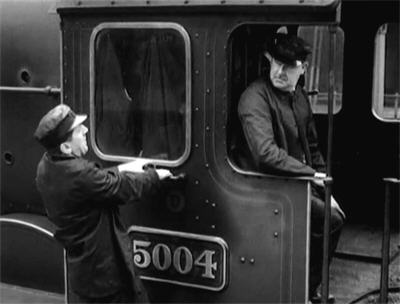
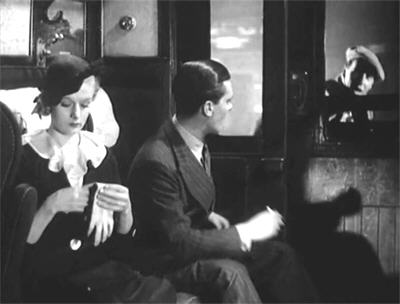
So it is. The passengers, trying to move around, notice the train’s speed, though of course at this stage all it means to them is a quick trip. Most of them move into the dining-car for some tea. Miss Smith, taking Sir Wilfred’s irritated prescription for her health seriously, orders dry toast and cold water; Mr Goddard, with Daisy’s encouragement, is not drinking tea; and Diana returns to the earlier point about Gerald managing her money, refusing to be put off. He finally elaborates that while he has twenty thousand pounds of his own – really – if he had just five thousand more, it would get his new company off the ground; and of course there would be a tidy return on Diana’s investment.
From here the conversation drifts rather acrimoniously to Diana’s break-up with Tommy, to whom she was “practically engaged”… Tommy himself, meanwhile, is breaking speed records on the road, yet having trouble keeping up with the train. His plan is to beat it to its first stop, but this is proving more difficult than he anticipated.
Up the front of the train, we find Holt muttering and snarling, and taking everything Charlie says the wrong way. Charlie then makes two serious errors: he remarks that, “Driving a train is getting on your nerves”, adding that it is time Holt gave it up; and he denies having seen Emily that day—all of which puts Charlie firmly in the camp of The Enemy. Charlie is getting nervous: Holt’s driving is becoming reckless, with no sign of slowing down as he approaches curves.
Pip (who has failed so far at all his attempts at pick-pocketing) has quick confab with Daisy in the corridor: she reports that she is on her way to Goddard’s compartment for yet another drink – on his part, anyway – while Pip warns her it’s only twenty minutes until the train’s first stop, and she needs to be done by then. The couple go their separate ways, with Pip drifting into the dining-car—where he recognises an old friend… Pip is too much of a professional to give Gerald away, but he has every intention of taking advantage of the situation if he can. Gerald, however, carries it off with a high hand and quickly steers the curious Diana out of the car.
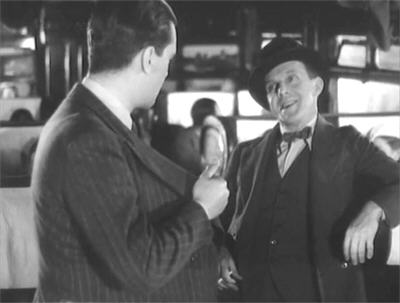

About this time the train’s speed passes from “fast” to “dangerously fast”. The passengers stumble and almost fall as they try to move around; Pip takes advantage of the frequent collisions to lift a watch from a pocket, while the lurching of the train lands the sodden Goddard in Daisy’s arms, allowing her to steal his wallet and make her escape out of his compartment. No sooner has she does so, however, than Goddard makes a remarkable recovery…
Daisy catches up with Pip in the dining-car, where she reports her success. Pip in turn reveals that he has lifted Gerald Winter’s wallet—which contains his copy of the marriage certificate. This is a matter of some importance to both parties since (as we later learn) Pip knows very well that Gerald is already married.
(Weirdly, the name on the certificate is “George”, not “Gerald”. Not that it really matters, since obviously neither is his real name.)
The train is now approaching Filby, where it is scheduled to make its first stop, but it shows no sign of slowing down. Charlie ventures to remonstrate with Holt, but he explodes on the subject of Charlie and Emily.
At the station, there is a crowd gathered on the platform—some of them dangerously close to the edge. A guard glances at his watch and remarks to his colleague that the train is ahead of time:
Second guard: “Bob Holt’s last trip.”
First guard: “Going out in style.”

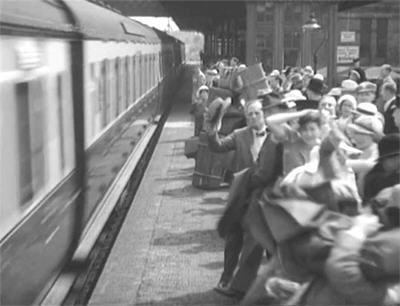
Onboard, those passengers intending to get out – Pip and Daisy amongst them – gather their belongings and move towards the doors…and very soon realise that the train is not slowing down. Instead, it tears through Filby Station at high speed, with the people on the platform desperately throwing themselves back out of harm’s way. The first guard rushes to the phone to report the failure to stop.
In the back of the train, a guard in the baggage-car reaches for the emergency brake, but is knocked down and seriously injured when the stacked luggage topples over. It also blocks the door, so that the second guard is unable to get to him—or to the brake.
Charlie, stunned and panicky, then learns that Holt has sabotaged the train’s communication-cord (the secondary emergency-brake system, in other words). Holt then begins furiously questioning Charlie about his relationship with Emily, sneering at his denials. Charlie throws himself across the driver’s compartment and grabs the brake—only to find himself at the point of a gun…
And here I really have to stop again and shake my head in disbelief at the – well, what would you call it? – the broadmindedness? the good sportsmanship? the foolhardiness? – of the Great Western Railway, who not only went along with a story about one of their drivers having a mental breakdown on the job, threatening the lives of everyone onboard one of their trains and at the end of that train’s run, but granted access to all their facilities, even to the point of the psychotic train-driver wearing their uniform and logos while shoving a gun in his colleague’s face. I mean to say—you can understand why Boeing went along with the Airport films: for all the terrible things that happen, they’re practically a love-letter to the company; but this is just astonishing.
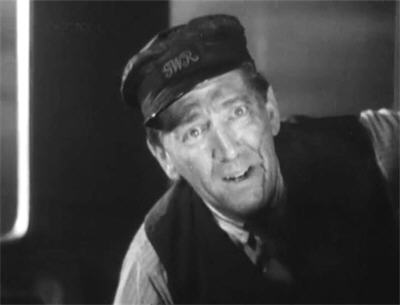
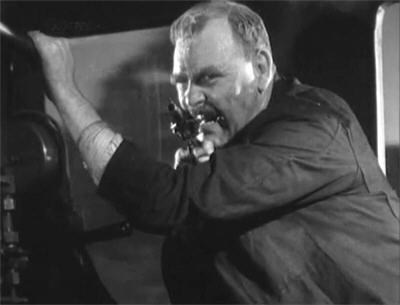
Seeing that his denials are making things worse, Charlie tries the opposite tactic of admitting everything—which makes things worse again. (While you’d otherwise struggle to find two films with less in common, this scene put me in mind of the confrontation between Robert De Niro and Joe Pesci in Raging Bull.) Having announced that he wasn’t going to stop the train until Charlie told him the truth about his affair with Emily, Holt of course responds to this “confession” by forcing the train to top speed. Charlie then tries to take it all back, but at this stage it doesn’t matter what he says; Holt is beyond his reach.
Meanwhile, the passengers are worried and confused by the failure to stop at Filby, but not yet frightened—except for Pip and Daisy, who have to get off the train at the first opportunity. Gerald and Diana are simply concerned that they might be on the wrong train; Gerald uses “finding out” as an excuse to hunt down Pip and Daisy, shoving them into an empty compartment and threatening Pip with dire retribution if he dares to let on to Diana that he’s married already. The three are so intent upon their argument that they don’t notice that Goddard is an interested listener—particularly to Gerald’s confession of bigamy.
(I can’t help thinking that these revelations would have been a genuine shock for audiences in 1936. Hugh Williams was a popular leading-man, nearly always in hero roles, and he’s topped-billed here; we saw him far more typically cast in The Dark Eyes Of London, playing the cop who cracks the case.)
Daisy stares in disbelief at Goddard’s obviously sober state—and realises in an instant what the truth must be. Goddard remarks genially that this has been a lucky journey: there he was, simply in pursuit of a couple of con-artists and thieves, only to stumble over a much bigger catch…
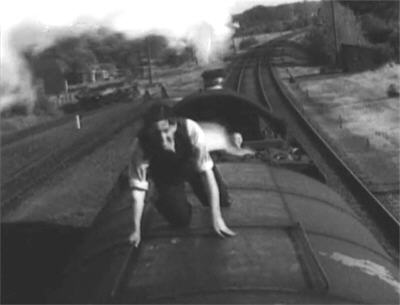

Out on the line, the danger posed by the train begins to escalate. It approaches a level-crossing at such speed, the guard barely has a chance to get the gates closed, so that an approaching car and its driver have a hair’s-breadth escape. Need it be said that this is the pursuing Tommy…?
Charlie is forced at gunpoint to keep shovelling coal, in order to maintain the train’s reckless speed. It is now that Holt reveals that he has no intention of stopping the train at all. At this, Charlie is desperate enough to try and wrestle the gun away from Holt, but is clubbed down for his pains.
The swaying and jerking of the train makes Goddard stumble, and Gerald takes the opportunity to knock him out cold; he then orders Pip and Daisy to get ready to get off at the next stop, which is imminent (he thinks), while he returns to his compartment to get Diana ready. It is while she is getting her things together that Diana happens to glance out the window—and sees Tommy’s car speeding along in parallel with the train.
At Amchurch we get a repetition of the events at Filby, with guards gaping in disbelief, passengers scattering, and the over-eager Pip nearly falling out, having opened the door a bit prematurely. (We also get an unexpected moment of humour, as a woman on the platform receives a stray toupee in the face.) Tommy, who brought his car to a screeching halt at the station moments before the train appeared, stares after it in deep concern that now has two very different origins.
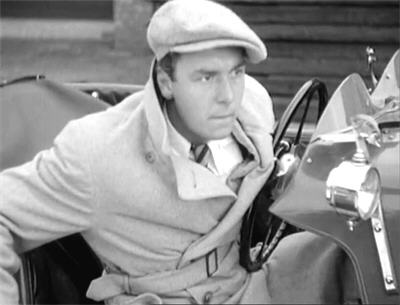

Realising that the train is not going to stop, and that there is no opportunity for escape, Gerald hurries back to the compartment where Goddard lies unconscious and, to the horror of Pip and Daisy, starts hustling him towards the external door. Pip hesitates, but Daisy does not, declaring firmly that she’s no killer, let alone a cop-killer; she plants herself in front of the door.
Before the situation is resolved, Miss Grebe makes herself useful for the first time: worn out by her relentless pamphlet distribution, she pushes her way into the compartment and sits down. Daisy gathers Goddard into her arms, keeping up the pretence of his having had a few too many; the three crooks exchange dismayed looks as the detective shows signs of coming to.
All along the line, the railway officials are reacting to the situation: the express is ignoring all signals, and so putting all other trains at risk. Recognising the extent of their danger, Charlie again jumps Holt, and a desperate fight ensues, with both men almost pushed off the moving train. Charlie finally knocks Holt down and tries to run for it over the top of the goods carriage behind, but Holt recovers and shoots at him wildly. Charlie collapses with a bullet in his arm, while Holt tosses away his empty weapon and goes back to stoking the engine, crying gleefully that Charlie can’t get away; none of them can get away…
Meanwhile, deciding that a car doing eighty isn’t up to the job, Tommy pulls into a small airfield and hires a plane.
(Planes, trains and automobiles!)


With Holt’s back turned, the wounded Charlie bravely drags himself up and staggers on. A railway official has contacted the train’s guard, warning him of a slow-moving goods-train on the line. The guard reports despairingly that there is no way of diverting the express. At this moment, the injured and bloodied Charlie drops into the carriage, setting off a general panic. A passenger rushes down the corridor, calling out for a doctor.
Pip takes advantage of the moment to haul Miss Grebe out of the compartment, so that they can “see what’s wrong”. Pip’s, shall we say, neutrality is interesting; all he wants to do is disassociate himself from the events playing out, whatever their end might be. It’s Daisy who stands in Gerald’s way, and as soon as the others are gone she and Gerald confront one another again over the inert form of Goddard. As they struggle, Gerald thrusts Daisy out of the external door. She grabs it just in time, dangling in space and screaming in terror as another train passes only inches away.
As she clings there, Goddard recovers sufficiently to struggle with Gerald on his own behalf. Daisy manages to pull herself back into the compartment, pushing past the men and calling for help—but turning back when the still shaky Goddard ends up halfway out the far door. She rushes across and grabs him, trying to hold Gerald at bay as he fights to give Goddard one final, fatal shove.
The arrival on the scene of Diana brings the struggle to a close. Gerald gives it up and hustles the bewildered girl back out of the compartment, allowing her to interpret what she has seen as himself and Daisy saving Goddard, while the other two collapse exhausted onto the seat.


Sir Wilfred hears and responds to the call for a doctor, and follows the passenger back to Charlie—whose story interests him a lot more than his injury, which is minor. After giving a rather incoherent explanation, Charlie remembers – now you remember!? – that he is carrying Emily’s letter, which he gives to Sir Wilfred. The doctor asks how to get to the driver’s compartment, but Charlie insists he’ll never make it, and staggers off himself to have one more try at stopping Holt. However, he is held up by the crowd of panicking passengers, who by this time have realised the extent of their danger. Sir Wilfred, sure that only he can stop Holt, takes the other way to the front of the train: the quicker but insanely dangerous outside route…
Meanwhile, the railway officials are working with extreme urgency to find a way of diverting the goods-train to a place of safety. The driver and engineer, more intent upon sausages roasted in a shovel over the train’s furnace, see nothing more in the frantic waving of a guard on a station they are passing than “friendliness”—until they notice that he is also pointing wildly at something behind them.
Now for the first time they notice the express on the same line, only a few hundred yards away and getter closer every moment. The two men strive to build their own speed, but can tell immediately that they will not be able to escape by these means. The railway officials contact the line’s point-guard, putting the resolution of the situation in his hands.
With the express train almost upon it, the goods train passes through a points junction; the sweaty, white-knuckled guard, with only a split-second to work in, sends the express onto a different line. As it tears past the goods train, the passengers cry out in relief and joy. But disaster is still imminent…and it is not until this moment that someone thinks to warn the Mulchester terminus about what’s headed their way…

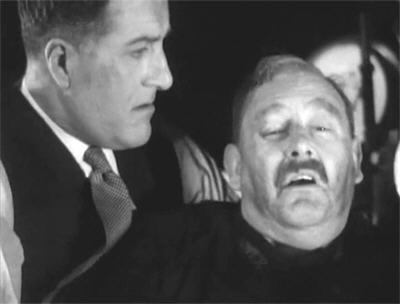
Through all this, there have been occasional cutaways to Sir Wilfred, hanging precariously from windows and doors and ladders as he fights his way to the front of the express. At last he swings himself into the driver’s compartment and holds off an attack by Holt by telling him he hasn’t come to stop him, he’s come to help; by shovelling coal, for a start. He starts stripping off his coat, telling him soothingly to wait just a minute, but Holt immediately resumes shovelling:
Bob Holt: “There’s no time to wait! There are no return tickets! This is the last journey!”
Sir Wilfred finally gets through to Holt by reminding him of their brief conversation on the platform in London, how Holt promised him a record run. But now, he adds, they’re losing speed. He turns the newly compliant Holt around, so that he can look out of the compartment. He urges him to look at the tracks – to keep watching the tracks, watching the tracks – while he talks quietly of Holt’s work record. Holt responds to this, speaking bitterly of Charlie’s contention that he was losing his nerve. Sir Wilfred agrees that this is nonsense, adding that Emily didn’t think he was, either. Holt reacts violently to this mention of his wife, but Sir Wilfred adds that he can prove it: he has Emily’s letter; wouldn’t Holt like to hear for himself?
Still insisting that Holt keep watching the tracks, Sir Wilfred reads to him Emily’s own words—how much she loves her husband, how she needs Charlie’s help, but for his, Bob’s, sake.
“Emily,” murmurs Holt. “Emily…”
But he obeys Sir Wilfred’s quiet voice and “eases her down”…
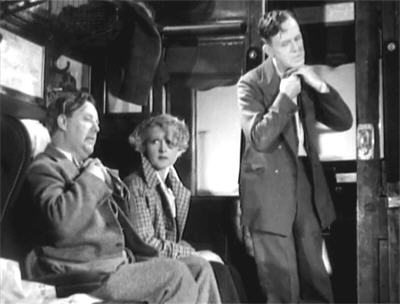
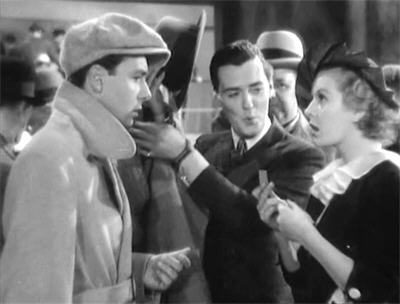
Relief sweeps over the passengers—even over Pip and Daisy; the former remarking resignedly that he supposes Mulchester jail will be as comfortable as the one at Amchurch. As he tidies himself, Goddard begins to tell a story about another detective who was escorting a couple of criminals on a train, and wouldn’t you know? – he looked away for just a moment, and, “Those two crooks opened the door and beat it,” concludes Goddard, settling himself into his seat and closing his eyes, “right under his very nose…”
(Unbelievably, when The Last Journey was released in America, the censors removed the escape of Pip and Daisy! So I guess the moral of that version is, don’t save a policeman’s life?)
Come Mulchester, come retribution—for more than one. Furious railway official storm the driver’s compartment, where a dazed but calm Holt observes that, “There’s been a bit of trouble, but we pulled through all right”, before collapsing in Sir Wilfred’s arms.
Meanwhile, Gerald and Diana are sprinting for an exit—but the police are waiting, and so is Tommy, whose mad pursuit was driven by his discovery that Gerald was a bit more than the “fortune-hunter” he first warned Diana about. Tommy breaks the glad tidings about Gerald’s pre-existing wife to Diana, which a passing Goddard confirms: “More than one, in fact.” Gerald, a good sport in defeat, hands over the tickets to “the Continent”…
Bob Holt is ordered bed-rest by Sir Wilfred (whose operation – for which he arrived early – saved his young patient’s life), and it is Emily who watches a train pull out below their windows—dead on time, but with a different driver for the first time in many, many years. Holt responds by calling the train, “A faithless old hussy; doesn’t care who’s taking her out. Not like you,” he adds, putting his arm around his wife…
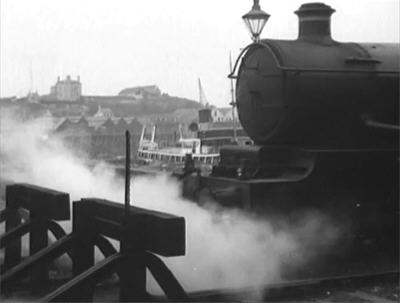

I have commented before about the amazing rapidity with which disaster movie clichés became set in stone from the very beginning of the genre. The Last Journey was made in 1936 – it is, very likely, the first film of its kind – and yet there is nothing here that isn’t immediately recognisable, or that – getting on for a hundred years later – isn’t still being trotted out on a regular basis, with greater or lesser degrees of seriousness.
(In that respect, permit me to recommend to you a film called Rough Air, which is basically nothing but a compendium of disaster movie clichés, done straight-faced but not seriously.)
Of course, it could be fairly said that disaster movies are really all about their clichés: push back against them too hard, and your film ceases to be a disaster movie at all; the trick is, rather, finding interesting ways to deploy them. Here, the spiralling revelations about Gerald’s criminal career, and the parallel revelation of Goddard’s true identity, provide some welcome variation in an otherwise familiar situation; the unexpected emergence of “Wilfred Rhodes, Action Hero” is pretty amusing, too.
The fact that the train doesn’t crash in The Last Journey makes no difference at all to its classification as a disaster movie; on the contrary. This film not only fulfils Golden Rule #1 of the genre overall – that is, it is entirely about its potential disaster – but also Golden Rule #1 of the transportation-related disaster movie, which I am yet to find anyone violating even after all these years: namely, “You Crash It In The First Twenty Minutes, Or You Don’t Crash It At All.”


Apparently this film was very popular in Sweden (?).
